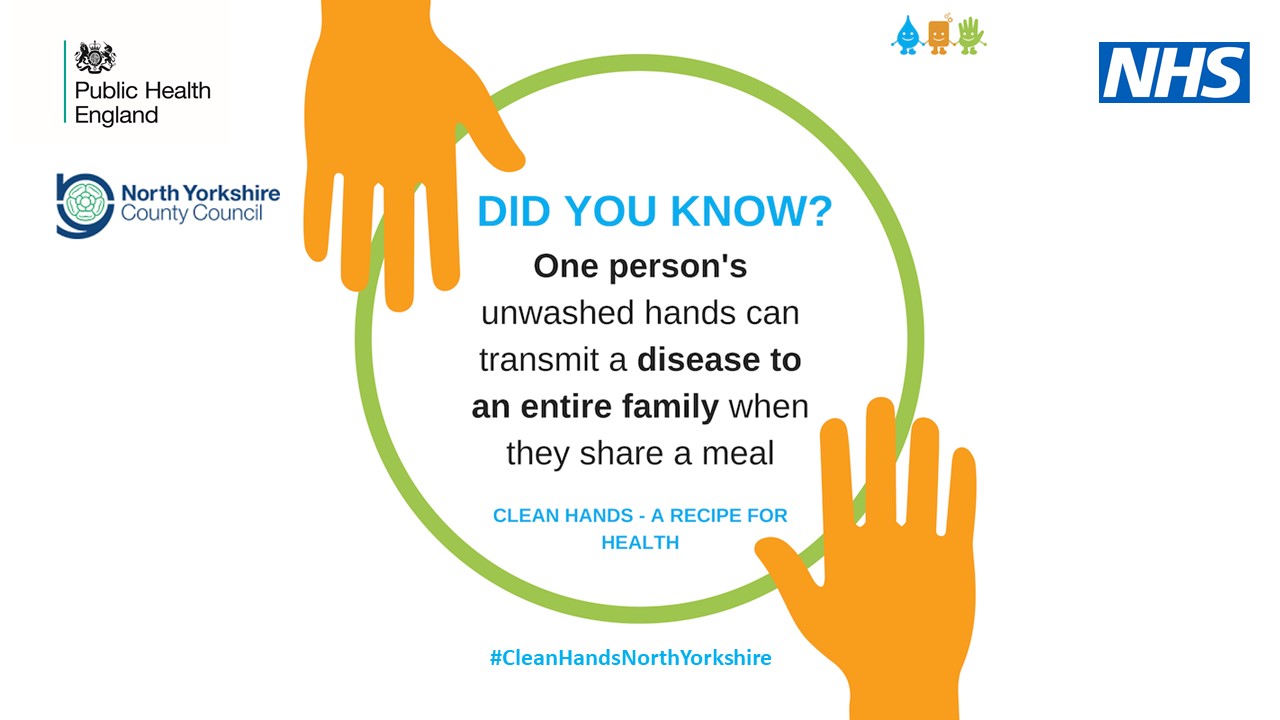- Public health experts in North Yorkshire launch ‘Clean hands – a recipe for health this summer’ a hand hygiene campaign as cases of Hepatitis A in Ripon remain under investigation
- Further cases of Hepatitis A throughout the summer are a possibility
- Handwashing with soap and water is a simple and effective way to prevent the virus and ensure overall health
- Local food businesses are also reminded of the importance of good food handling practices and hygiene standards, as Hepatitis A can be passed on by eating food or drinking water containing the virus.
- Anyone with suspected Hepatitis A are reminded not to prepare food for others
As families across North Yorkshire prepare for the long school break, public health leaders are reminding everyone that hand hygiene is the simplest and easiest way to avoid the spread of any infection, including Hepatitis A, this summer.
The reminder is issued as Public Health England Yorkshire and the Humber, North Yorkshire County Council and local NHS organisations continue to investigate an outbreak of Hepatitis A in Ripon, with cases now totaling 29 since 19 June. With increased social mixing of children and families during the school holidays, experts are advising that the best and simplest form of prevention is for everyone to wash their hands regularly with soap and water, particularly after going to the toilet and before preparing food. Anyone who is suspected to have the virus is reminded to avoid preparing and handling food for others.
Dr Lincoln Sargeant, Director of Public Health at North Yorkshire County Council said: “It’s encouraging that in recent weeks, the outbreak of hepatitis A has slowed down but we cannot become complacent and the possibility of further cases throughout the summer remains.
“Hepatitis A virus can also spread easily within families and where people mix closely together. Summer gatherings, day trips, holidays, play dates – they’re all an important part of us enjoying a fun and memorable summer and we understand that it’s not always easy to fit hand washing into these busy summer days. But we want everyone to enjoy these events safely and our hands really are the leading carriers of germs. Handwashing with soap and warm water is a simple and effective way to ensure overall health throughout the summer break. We urge everyone to keep this in mind and practice regular hand washing, however they plan to spend the summer.
“Local food businesses are also reminded of the importance of good food handling practices and hygiene standards, particularly as Hepatitis A is passed from person to person by eating food or drinking water containing the virus.”

Dr Mike Gent, Deputy Director, Public Health England Yorkshire and the Humber, added: “Washing your hands properly removes dirt, viruses and bacteria to stop them spreading to other people and objects like food, which can spread illnesses, including Hepatitis A.
“Whether you’re an adult or a child – hands are easily contaminated with faecal [poo] bacteria when going to the toilet and this can be easily spread on to other things you touch, including food. Unfortunately, not all people consistently wash their hands after going to the toilet or before handling food and children often require supervision to ensure they’re handwashing effectively.
“Washing your hands with soap and water is sufficient to remove dirt, bacteria or viruses like Hepatitis A and reduces your risk of diarrhoea illnesses considerably. Remember that alcohol gels are not as effective as washing with water and soap and shouldn’t be used as a substitute.”
Everyone should wash their hands:
- After using the toilet
- After handling raw foods like chicken, meat and vegetables
- Before eating or handling ready to eat food
- After having contact with animals, including pets
Top tips for effective handwashing are:
- Washing your hands properly should take about as long as singing “Happy Birthday” twice (around 20 seconds).
- Wet your hands with water (warm or cold).
- Apply enough soap to cover all over your hands. You can use alcohol-based handrub if you don’t have immediate access to soap and water.
- Rub hands palm to palm.
- Rub the back of your left hand with your right palm with interlaced fingers. Repeat with the other hand.
- Rub your palms together with fingers interlaced.
- Rub the backs of your fingers against your palms with fingers interlocked.
- Clasp your left thumb with your right hand and rub in rotation. Repeat with your left hand and right thumb.
- Rub the tips of your fingers in the other palm in a circular motion, going backwards and forwards. Repeat with the other hand.
- Rinse hands with water (warm or cold).
- Dry thoroughly, ideally with a disposable towel.
- Use the disposable towel to turn off the tap.
ENDS
Notes to editors:
- Further information on effective hand washing can be found at: https://www.nhs.uk/live-well/healthy-body/best-way-to-wash-your-hands/
- General information on Hepatitis A can be found at nhs.uk or by phoning NHS 111.
- Symptoms of Hepatitis A include:
- Yellowing of the skin and eyes (jaundice)
- Mild fever
- Joint and muscle pain
- Feeling and being sick
- Diarrhoea
- Loss of appetite
- Stomach pain
- Dark-coloured urine
- Itchy skin
Not everyone infected will have all these symptoms.
- Hepatitis A is a viral infection which affect the liver and is a different disease from Hepatitis B and Hepatitis C.
- Anyone with suspected hepatitis A infection should not attend school or work until their doctor advises return. This is usually for a period of one week.